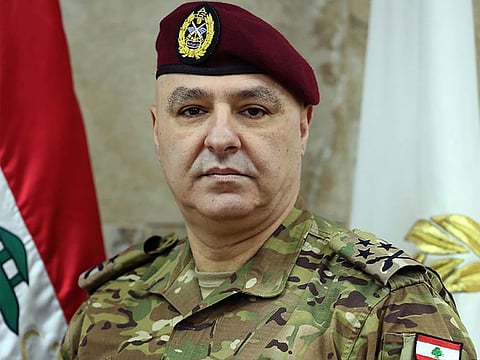Lebanese Army Commander Joseph Aoun seen as a president-in-waiting after Doha visit.
It’s been almost 2 months since Aoun’s term ended, but Lebanon is still without president

Beirut: Lebanese Army Commander Joseph Aoun was in Qatar, raising speculation in Beirut that an Arab initiative is in the works to make him president.
On December 10, Joseph Aoun landed in Doha for an official visit, technically framed to discuss military cooperation between Qatar and Lebanon.
In light of the presidential vacuum in Beirut, the timing of the visit has raised eyebrows, given that Aoun is on the shortlist of names earmarked to replace ex-president Michel Aoun, whose term ended on 31 October 2022.
Joseph Aoun was first raised by commander of the Lebanese Forces Samir Gagegea back in July 2022, who suggested that he would make a fine successor to Michel Aoun.
It’s been almost two months since Michel Aoun’s term expired, and despite nine voting sessions held since then in parliament since then, lawmakers have been unable to agree on a successor, leaving the presidential seat at Baabda Palace vacant.
Frangieh versus Bassil
Two names have been making the rounds, although neither has officially nominated himself for the job. One is Michel Aoun’s son-in-law Gibran Bassil, a US-sanctioned former foreign minister who heads the Free Patriotic Movement (FPM).
Second is Suleiman Frangieh, scion of a historic Maronite dynasty whose grandfather and namesake had been president of Lebanon at the start of the country’s civil war, back in 1975.
Both Frangieh and Bassil are allies of Hezbollah leader Hassan Nasrallah, who nevertheless prefers seeing the former as Lebanon’s next president. His condition for president is someone who “protects” the arms of Hezbollah, something that Frangieh has pledged to do since first being nominated for the job back in 2016.
Fruitless effort
Last May Nasrallah brought the two men together at a Ramadan iftar, trying to talk Bassil into dropping his candidacy in favour of Frangieh — an effort that proved fruitless.
Bassil’s cooperation on electing a president is vital, given that he commands a parliamentary bloc of 21 MPs. Electing a president requires two things: consent of the prime minister and a majority vote of 65 MPs in Parliament.
The Lebanese Forces (LF) of Samir Gagegea, another Christian heavyweight, has refused to endorse either of the two candidates, accusing them of being too close to Hezbollah. Instead, he has nominated instead MP Michel Mouawwad, the son of a former president assassinated during the final stages of the Lebanese Civil War.
Although he has no political party behind him, Mouawwad has been receiving anywhere between 36-44 votes in every of the nine voting sessions in parliament, still not enough to make him president.
For very different reasons, Hezbollah and the FPM have been voting with blank papers. Hezbollah wants Frangieh as president while the FPM insists that their only choice for president is Gibran Bassil.
The Joseph Aoun option
Given the gridlock, many have started to seriously consider Joseph Aoun as president, given that he is a professional soldier, unaffiliated with any of the warring political parties.
Born in 1964, Aoun hails from the village of Al Ayshieh in the Jezzine District. Although carrying the same family name, he is unrelated to President Michel Aoun who appointed him army commander in 2017.
The Qatari role
His December visit to Doha triggered widespread media attention in Lebanon and beyond, as many speculated whether the Qataris were grooming him for the vacant presidential seat. Back in June 2022, Qatar had pledged $60 million USD to support the bankrupt Lebanese Army under Aoun. Doha had also played a similar mediating role back in 2008, orchestrating a political agreement to end a seven-month presidential vacuum in Lebanon, which concluded with the election of Michel Suleiman — another army commander — as president.
Obstacles and hurdles
But electing a president requires more than just regional consensus. In addition to a 65-vote majority in parliament, Aoun’s candidacy would need a one-time constitutional amendment. According to the current Lebanese charter, an officer needs to resign from the armed forces before nominating himself for a civilian job like the presidency, which Aoun is yet to do. Additionally, he would need a minimum lapse period of three months before submitting his candidacy.
The Maronite Patriarch Beshara Al Rai is opposed to the one-time constitutional amendment, clearly unenthusiastic about yet another officer-turned-president, given its troubled relationship with Michel Aoun. Support of the Maronite Church is vital, since by norm, the presidency has been held by a Maronite Christian since 1943.
Also opposing the constitutional amendment is Gibran Bassil and his Free Patriotic Movement. Speaking in a television interview on 11 December, Bassil said: “The equation that its either Suleiman Frangieh (for president) or Joseph Aoun is unacceptable.”
This was the first time since Aoun’s name surfaced in June that Gibran Bassil has spoken publicly about the army commander’s candidacy for president.
Saudi Arabia remains officially neutral on the vacant Lebanese presidency, but it is an open secret that they would like to see a president who is free from Hezbollah control, explaining why they would prefer Joseph Aoun to either Suleiman Frangieh or Gibran Bassil.
According to sources who spoke to Gulf News, Aoun is planning to visit Riyadh by next January. Tehran is unhappy with Aoun’s candidacy, however, and so is Hezbollah whose leaders cannot overcome the fact that his name was first put forth by none other than their arch-enemy, Samir Gagegea.
If Joseph Aoun makes it to the presidency, he would be the fifth general to become president of Lebanon after Fouad Shihab (1958-1964), Emille Lahhoud (1998-2007), Michel Suleiman (2008-2014), and Michel Aoun (2016-2022).
Sign up for the Daily Briefing
Get the latest news and updates straight to your inbox



